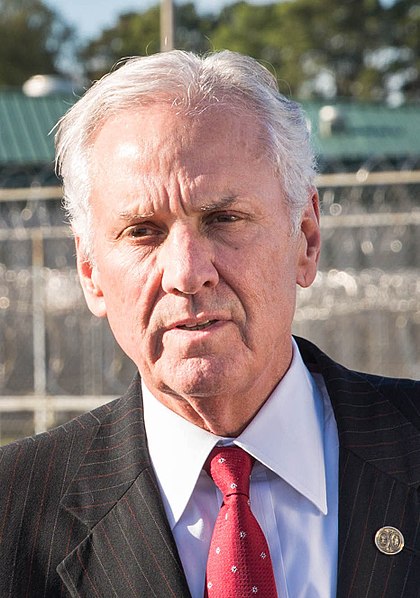South Carolina Moves to Censor Palestine Advocacy at Public Colleges and Universities (Updated)
/Updated July 9, 2018: On July 6, South Carolina Governor Henry McMaster signed the budget bill into law, including a provision requiring public colleges and universities to consider a widely discredited re-definition of antisemitism in investigating accusations of discrimination. The law will be in effect for one year. Palestine Legal will monitor its implementation and will explore possible legal challenges.
Updated May 3, 2018: The budget bill including the discredited antisemitism re-definition passed the Senate on April 12 and the House on May 2. Once the two versions of the bill are reconciled, it will be passed to Governor McMaster to sign into law. Check here for updates.
South Carolina Governor Henry McMaster. Photo: Zach Pippin/WikiCommons
April 18, 2018: Language aimed at censoring Palestine advocacy at South Carolina’s public colleges and universities was added to a 2018-2019 budget bill last week. If passed, the budget will codify a widely discredited re-definition of antisemitism that classifies virtually all criticism of Israel and Israeli government policy as inherently antisemitic. The legislation would require public colleges and universities in South Carolina to use this overbroad definition when investigating alleged acts of antisemitism on campuses.
The legislation is backed by the Brandeis Center, whose founder and director, Kenneth Marcus, was nominated in November by President Trump to head the civil rights division of the U.S. Department of Education. Marcus’ confirmation vote is pending in the U.S. Senate following an outcry of opposition from a wide range of civil and human rights organizations.
The overbroad antisemitism language was added to the state budget after it stalled as a stand-alone bill due to constitutional concerns for two years in a row. The 2018-2019 state budget passed the South Carolina Senate last week and is currently being considered by the House. It is expected to pass and to be signed into law by Governor Henry McMaster, who has previously affirmed his support for the antisemitism legislation, according to media reports.
Because the legislation is attached to the 2018-2019 state budget, it will expire after one year unless reauthorized by lawmakers.
“This legislation is a blatant violation of students’ constitutional right to support Palestinian freedom,” said Rahul Saksena, Staff Attorney for Palestine Legal. “This kind of censorship has no place in a so-called democracy, particularly on college campuses, where we need students and scholars to engage in a vigorous exchange of ideas, especially around issues of public concern like Palestinian rights, and especially at a time when Israel is killing and maiming Palestinians in Gaza for protesting for their basic rights, in blatant violation of international law.”
If enacted, the legislation could require public colleges and universities in South Carolina to violate students’ First Amendment rights. Students for Justice in Palestine (SJP) and other campus groups and individuals who seek to educate others about Israel’s violations of Palestinian rights will likely face increased scrutiny, investigations, censorship, and possibly punishment for speech and activities that are critical of Israel and Israeli government policies. Courts and government bodies have consistently held that speech activities critical of Israel – including boycotts for Palestinian rights – are protected by the First Amendment.
"Senator Larry Grooms' insertion of this unconstitutional bill as a rider on the 2018-2019 budget is a deceitful effort to silence the First Amendment rights of those who protest the Israeli occupation of Palestine,” said Arya Novinbakht, a member of SJP at the University of South Carolina. “This legislation aims to silence any voices critical of Israeli policy or supportive of Palestinian rights. It is part of a troubling rightwing effort across the country to usurp civil rights, civil liberties, and our right to advocate for justice in Palestine."
Similar efforts to codify the overbroad re-definition of antisemitism have failed due to constitutional concerns in the U.S. Congress and Virginia.
Residents of South Carolina can register their opposition to this legislation by contacting their member of the State House here and the governor here.
Click here to read our memo, issued in 2017, to lawmakers against the stand-alone bill.
Click here for an in-depth FAQ on the problematic re-definition of antisemitism endorsed by this legislation.


